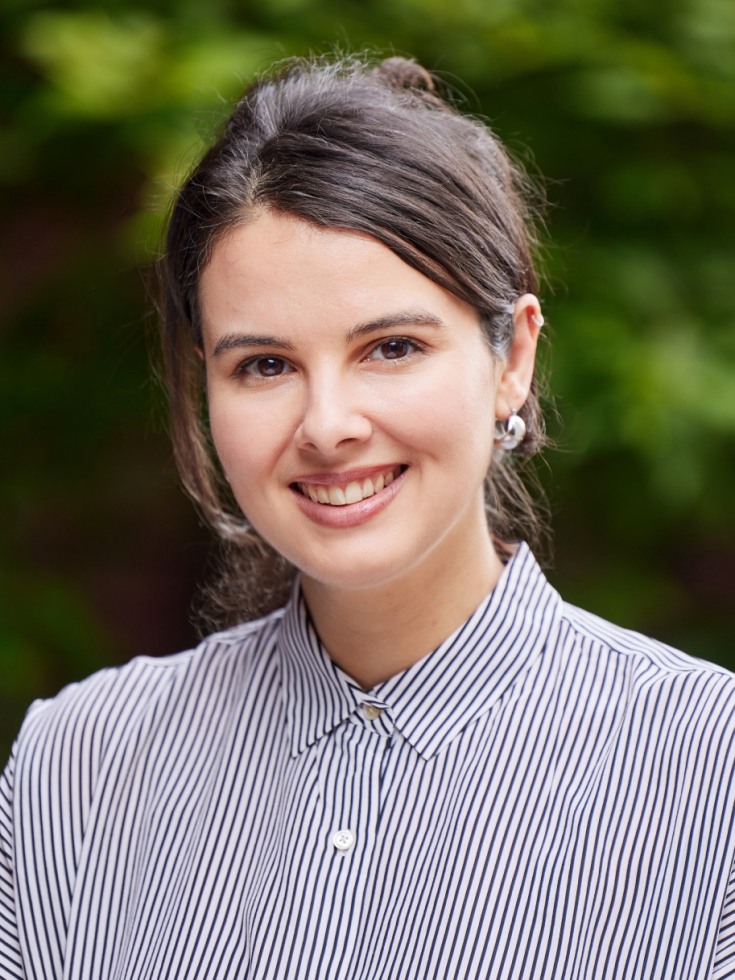With a deep interest in healthcare, Laura Cianciolo felt that a Master of Public Affairs (MPA) degree would provide a broad and comprehensive understanding of healthcare policies and politics. "Brown's MPA program had a great focus on policy analysis and leadership, which aligned with my goal of making a meaningful impact in healthcare," she said. The Watson Instutute's accelerated one-year program appealed to Cianciolo, who relished diving into substantive material and applying her knowledge shortly thereafter. "In healthcare's fast-paced environment, where new treatments and policies rapidly emerge, I wanted to be engaged in a program that moved just as quickly."
Early in her career, Cianciolo worked for the Vilcek Foundation, which highlights the contributions of immigrant scientists to biomedical research. "Each year, we honored scientists who had made groundbreaking advances in biomedical research," said Cianciolo. "Seeing firsthand the impact of such transformative and often life-saving research inspired me to pursue a role in that field. That led to my role at the Institute for Clinical and Economic Review (ICER), where I found the perfect balance between my passion for policy and my newfound interest in biomedical research."
Today, Cianciolo is a senior research associate at Stratevi, a biotechnology consulting firm that supports companies developing innovative drugs and devices. "I'm driven by the opportunity to make a real difference for patients, especially those in vulnerable populations or with rare diseases," she said. "I love being part of the process that helps ensure these life-changing treatments are accessible to everyone who needs them."
Cianciolo's work with Stratevi aligns with her earlier career experiences, including at the nonprofit Institute for Clinical and Economic Review, where she evaluated the clinical and cost-effectiveness of drug therapies for Alzheimer's disease, obesity and certain autoimmune conditions.
As Cianciolo had been away from academia for seven years before enrolling at Brown, she was apprehensive about jumping into the program's rigorous and intense academic schedule. Those worries proved misplaced, however, as she graduated with a 4.0 grade point average. While she found the summer analytical sequence of statistics, economics and econometrics especially challenging, Cianciolo said, "With the entire cohort experiencing these accelerated courses together, it felt like a shared challenge."
Cianciolo found her Policy in Action project with the US-Mexico Foundation especially consequential. Her team partnered with the foundation to conduct a comparative assessment of several different economic trade blocs, especially consequential. Cianciolo compared the July 2020 United States-Mexico-Canada Agreement (USMCA), the European Union, the Association of Southeast Asian Nations, and Mercado Común del Sur (MERCOSUR), the 1991 regional trade agreement whose founding members were Argentina, Brazil, Paraguay and Uruguay. "Working on this project provided an immersive experience in real-time policy analysis, as USMCA is up for review in 2026," said Cianciolo. "It was exciting to realize that some of our recommendations could shape future policy or drive meaningful reforms in the trade agreement."
When a friend in Brown's Master of Public Health (MPH) program invited Cianciolo to join her Hack for Humanity team, Cianciolo jumped at the opportunity. The 2023 hackathon — an annual event sponsored by Watson's Center for Human Rights and Humanitarian Studies (CHRHS) — focused on how to better prepare for and respond to humanitarian emergencies through community-centered design.
With only 24 hours to develop a solution and mentorship from faculty members Adam Levine and David Polatty, the ten teams presented their respective pitches. "It was amazing to see how much creativity and problem-solving can occur on a tight deadline and how each team approached the issue from a unique perspective," said Cianciolo. "Our team, which focused on sustainable systems of learning beyond the classroom, placed second. With no background in humanitarian crises or education, this was a 'crash course' for me and demonstrated the importance of interdisciplinary problem-solving."
